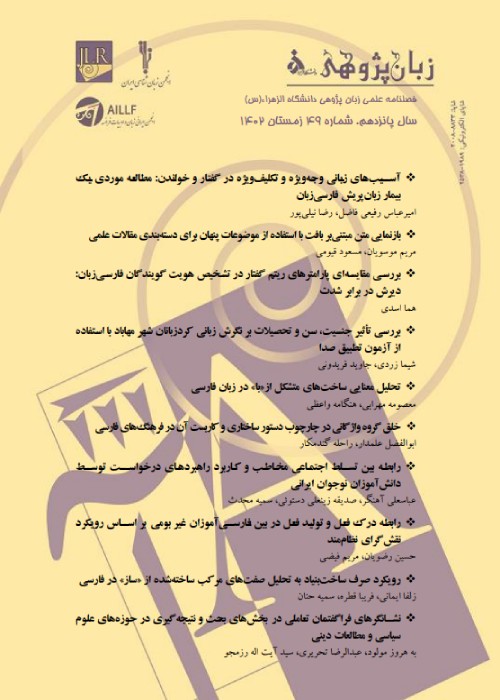The study on power and certainty in the language of Kurdish speakers based on Lakoff's Dominance Approach
Power and Certainty in Language; a study on Kurdish based on Lakoff's Dominance Theory "If a little girl 'talks rough' like a boy, she will normally be ostracized, scolded, or made fun of" (Lakoff, 1973: 47). Lakoff believed that society keeps children in line, in their place; which means the society needs girls and boys to behave according to their sex in every aspect of their social life. She reflected, although, "this socializing process is harmless and often necessary in many aspects", it has the potential to raise serious problems when it is used in language, due to the fact that "the acquisition of this special style of speech will later be an excuse others use to keep her in demeaning position, to refuse to take her seriously as a human being". This was a big claim, which urged many linguists to investigate how true it is. Although more than four decades have passed since Lakoff first introduced her think, still the question whether gender is responsible for the way women talk has not been answered and requires more debate; the reason for this article be written. We think if Lakoff's claim is true, it can be easily surveyed in Middle East, with the dominant soul of patriarchy stronger than that of western world. In this article, we interviewed 20 women of two educational levels (attending university versus non-attending university) and 20 men, again with the same two educational levels. Age was controlled and all the interviewees were between 25-35 years old. All the interviewees were speakers of Sorani Kurdish, living in Kamyaran, a town in Kurdistan Province, Iran. Lakoff explored what she called 'Dominance Theory' "with regard to lexicon (color terms, particles, evaluative adjectives), and syntax (tag-questions, and related aspects of intonation in answers to requests, and of requests and orders)" (1973: 45), and asserted that there are systematic linguistic differences between men and women's talking, showing that women's language conveys components which bring uncertainty and lack of self-confidence to them. In other means, Lakoff knows "talking like a lady" a powerless language. In order to investigate this powerlessness, we extracted some data out of the interviews, and then, re-extracted it after some months through internal validity test to be sure of its validity. The results of the data by chi-square test demonstrates that there is a significant relation between gender and 'lady talk' in Kurdish. The female interviewees, regardless of their education, employed all the points raised in the theory more than the men, except for taboos; 37 taboos by women against 60 ones by men, which is in line with Lakoff's claim. However, education plays differently; we expected that educated women and men use stronger version of language, on the grounds that education seems to bring self-confidence. But, comparing higher educated ones with less educated ones did not prove that education makes speech stronger. Among the 10 components pertaining to the power of language, higher education lessens 5 of them (including hedgings, expletives and vulgar expressions, tag questions, emphatic stress and rising intonation) while reinforcing the other 5 (empty adjectives, super polite forms, indirect requests, color terms and weak quantifiers), regardless of gender. To better understand it, look at the following bar graph. In sum, by the help of the effects of education on language, one can deduce that the features of the language been regarded as powerless by Lakoff are correct choices; when a person's knowledge grows, s/he happens to be more conscious that her/his understanding of the world is imperfect, then s/he uses less certain terms (like weak quantifiers). Furthermore, more education makes a person be more sensitive to her/his social status, driving her/him to use more 'polite forms' and 'indirect requests'; a kind of withdrawal from boasting to be super strong, and in response, getting more respect. Our study, not only, confirms Lakoff's general notion that gender is the main variable in the certainty of language, but admits that the features she declared for her theory, except for color terms, are key ones in considering the power of language. Some of the references: • Hudson, R.A. )1990(. Sociolinguistics. Cambridge: Cambridge university press. • Lakoff, R. (1973). "Language and Woman’s Place". Language in society, 2, pp. 45-80. • Lakoff, R. (1975). Language and Woman’s Place. New York: Harper & Row. • Lakoff, R. (2004). Language and Woman's Place, Text and Commentaries. Oxford: Oxford University Press. • Longobardi, E., Spataro, P., & Frigerio, A. (2016). "Gender Differences in The Relationship Between Language and Social Competence in Preschool Children". Infant Behavior and Development, 43, pp. 1-4. • Trudgill, P. (1983). Sociolinguistics. An Introduction to Language and Society. Harmondsworth: Penguin Books.
power , certainty , Gender , Sorani dialect , Lakoff
- حق عضویت دریافتی صرف حمایت از نشریات عضو و نگهداری، تکمیل و توسعه مگیران میشود.
- پرداخت حق اشتراک و دانلود مقالات اجازه بازنشر آن در سایر رسانههای چاپی و دیجیتال را به کاربر نمیدهد.


